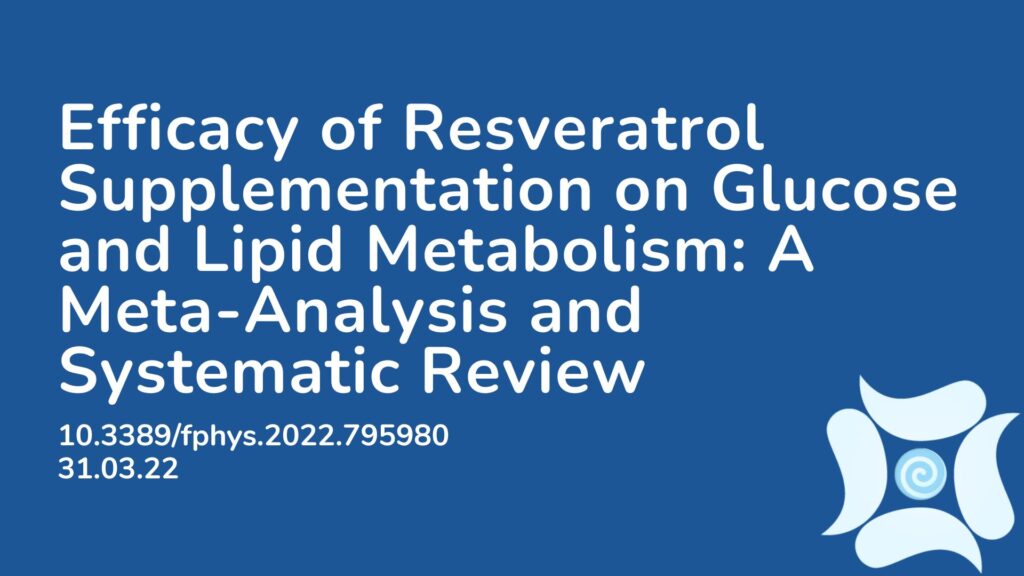Summary: This meta-analysis and systematic review of 25 articles – including 1,171 participants – looked at the relationship between lipid metabolism and resveratrol supplementation, as current literature on this topic has been controversial with mixed results. The results of this review showed that resveratrol supplementation had signigicant effects on waist circumference, hemaglobin A1c, total cholesterol, and low and high density lipoprotein cholesterols. For patients with diabetes, their findings showed that resveratrol intake can reduce glycosylated hemaglobin A1c and blood glucose, as well as long term glucose regulation. In summary, the findings indicate that resveratrol supplementation regulates glucose and lipid metabolism, which has powerful and significant benefit for overweight or diabetic patients, which is of high clinical value. Given that almost two million Australian’s have diabetes, and a further two million have pre-diabetes and are at risk of developing diabetes, safe, accessible and cheap treatment options such as resveratrol supplementation can have beneficial public health impacts as well as reduced burden of disease
Abstract:
Background: Lipids are ubiquitous metabolites with diverse functions. Excessive lipid accumulation can trigger lipid redistribution among metabolic organs such as adipose, liver and muscle, thus altering the lipid metabolism. It has been revealed that disturbed lipid metabolism would cause multiple disease complications and is highly correlated with human morbidity. Resveratrol (RSV), a phytoestrogen with antioxidant, can modulate insulin resistance and lipid profile. Recently, research on RSV supplementation to improve glucose and lipid metabolism has been controversial. A meta-analysis may provide a scientific reference for the relationship between lipid metabolism and RSV supplementation.
Methods and analysis: We searched the PubMed, Cochrane Library, Web of Science, and Embase databases from inception to October 2021 using relevant keywords. A comprehensive search for randomized controlled trials (RCTs) was performed. For calculating pooled effects, continuous data were pooled by mean difference (MD) and 95% confidence interval (CI). Adopting the method of inverse-variance with a random-effect, all related statistical analyses were performed using the Rev Man V.5.3 and STATA V.15 software.
Results: A total of 25 articles were incorporated into the final meta-analysis after removal of duplicates by checking titles and abstracts and excluding non-relevant articles. The selected articles had a total of 1,171 participants, including 578 in the placebo group and 593 in the intervention group. According to the current meta-analysis, which demonstrated that there was a significant decrease in waist circumference (SMD = –0.36; 95% CI: –0.59, –0.14; P = 0.002; I2 = 88%), hemoglobin A1c (–0.48; –0.69, –0.27; P ≤ 0.001; I2 = 94%), total cholesterol (–0.15; –0.3, –0.01; P = 0.003; I2 = 94%), low density lipoprotein cholesterol (–0.42; –0.57, –0.27; P ≤ 0.001; I2 = 92%), high density lipoprotein cholesterol (0.16; –0.31, –0.02; P = 0.03; I2 = 81%) following resveratrol administration.
Conclusion: These results suggest that RSV has a dramatic impact on regulating lipid and glucose metabolism, and the major clinical value of resveratrol intake is for obese and diabetic patients. We hope that this study could provide more options for clinicians using RSV. Furthermore, in the future, large-scale and well-designed trials will be warranted to confirm these results.
Article Publication Date: 31.03.22
DOI: 10.3389/fphys.2022.795980



